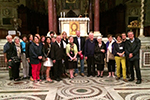Document Type
Article
Publication Date
5-2024
Journal Title
Reference Services Review
Volume
52
Number
2
Abstract
Purpose This paper engages multidisciplinary perspectives on truth, authority, expertise and belief to unpack and better understand the underlying epistemology and implications of the ACRL frame “authority is constructed and contextual”.' Design/Methodology/Approach Following an overview of the issues confronting us in a “post-truth world”, the paper reviews critiques of the ACRL frame “authority is constructed and contextual” and examines the related concepts of truth, authority, expertise and belief from multidisciplinary perspectives. Findings While the frame acknowledges the limitations and biases of current scholarly publishing and implicitly supports social justice, it runs the danger of promoting relativism and is ambiguous regarding the relationships between expertise and authority. The critical concepts of truth and belief are conspicuously absent. Engaging a critical discussion and understanding of these concepts is a valuable contribution to information literacy. Originality/Value This paper offers an important and accessible analysis of the frame “authority is constructed and contextual” and its underlying concepts. It moves beyond the library literature to include multidisciplinary perspectives, and will require the engagement of the wider library community to promote discussion of the underlying epistemology and links between the construction of authority and truth, expertise and belief. In particular, the discussion of the construction of belief and the difference between judgments of fact and judgments of value offers important additions to the library literature.
Recommended Citation
Rose-Wiles, lisa M., "The Framing of Authority in the ACRL Framework on Information Literacy: Multidisciplinary Perspectives on Truth, Authority, Expertise and Belief." (2024). Praxis Publications. 6.
https://scholarship.shu.edu/praxis-publications/6

